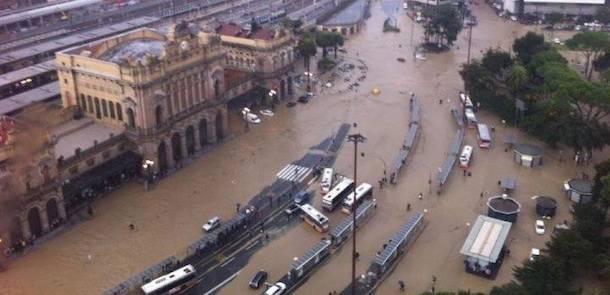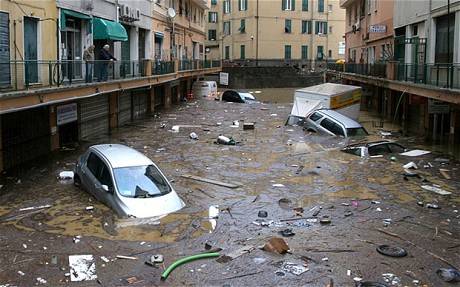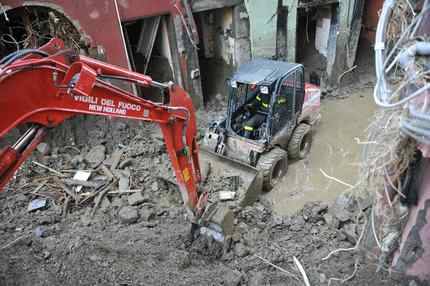As Genoa Drowns, Berlusconi Struggles to Stay Afloat
ROME. The river of rushing muddy water, up to three feet deep, which raced through Genoa’s main streets Friday carried with it automobiles, huge garbage bins, motorcycles and—as one amateur photographer’s footage showed—a man who had lost his balance and was dragged by the water. The balance: six dead, including two small children, and many injured. At this writing Sunday evening concerns turned to Piedmont and the risk that the Po River might overflow its banks. As the torrential rains moved down the Italian peninsula, the Campania region with its archaeological treasures was struck, with one dead when a tree fell on an automobile.
In Genoa the water and mud had not cleared when recriminations began, themselves a tsunami attacking city officials and particularly mayor Marta Vincenzi, 64, blamed for not having ordered businesses, offices and all schools closed beforehand. For two days there had been forewarnings of tremendous storms on the way, but local authorities had decided these warnings sufficed. Today an official judiciary inquiry has been opened against possible negligence, but against “unknown” individuals. The mayor, elected in 2007 on a center-left political slate, has come under sharp criticism for delays in informing parents not to venture outdoors to collect their children from school. That request came only at 2:45 pm.
But the heart of the problem is more complex. According to a Greenpeace spokesman, Giuseppe Onufrio, “It’s a combination of problems: global warming that’s turning Italy’s climate more tropical, not tending to trees and the environment, and over-building without proper controls. We also need to understand how to manage emergencies better.” Others add that storm sewers and streams have not been kept clear.
The fragility of the Italian heritage is hard to understate. Eleven days ago one of Italy’s greatest treasures, the Cinque Terre on the Ligurian coastline, was devastated by storms, beginning with a small tornado. The Cinque Terre are in fact five towns perched on a mountainside that drops precipitously down to the sea. The incredibly picturesque central villages cannot be reached by automobile, but solely by walking the steep connecting footpaths or via a train line tunneled through the formidable mountain. The area is a world heritage site for its natural and man-made beauty, which includes dry stone wall terracing. And this is the problem, according to one former resident, a baker. “European Union farm products have undercut the Cinque Terra farmers. Aside from wine, countless fields have been abandoned.”
Along with abandoned fields comes negligence in maintaining those incredibly steep dry stone walls. Far worse, uncontrolled building construction has stressed the area. The result: a wall of mud that has all but destroyed these precious and splendid villages, further cut off by mud and water blocking the train tunnel.
Those willing to make a contribution of 2 Euros to help in the emergency in Genoa and the Cinque Terre can send an SMS by dialing, from the US, +39 45500. This is the official collection point, sponsored by Il Corriere della Sera daily and by La Sette TV network.
The twin disasters in Liguria have briefly upstaged the government’s defensive strategy, but the problems remain. Indeed they were aggravated when, at the G20 meeting in Cannes, Premier Berlusconi told incredulous reporters that he has no sense of an economic crisis in Italy because “the restaurants are full of people, and the plane flights to vacation spots are also full.” Objectively speaking, this was contradictory (and what is perhaps worse, it was troubling), for the world’s greats, from the U.S. president to China’s, had turned out to discuss the dire economic situation.
The problems will hit the famous fan on Tuesday, when a vote in Parliament will be held on the budget revisions. Will the government have its bare majority of 316? Rumors are rife that it will not, and supposedly Berlusconi’s top aides, beginning with Gianni Letta, 76, have informed him that there have been so many defections in the Freedom Party (PdL) that the government will lose in a vote of confidence. Their advice to him, supposedly (nothing is certain), was to resign beforehand, in order to save face. Berlusconi has retorted that he has no intentions of resigning, however, and gossip has it that the reason he privately gave for his refusal is that, if he quits, his sharkish enemies would destroy his commercial interests, beginning with the his media empire. La Repubblica reports that some twenty PdL members of Parliament will no longer support the Berlusconi cabinet.
Pier Ferdinando Casini, the moderate centrist with considerable Catholic backing, has been courted by the PdL in hopes of his joining the rightist coalition that would keep the Berlusconi party (if not Berlusconi himself) in charge. Casini is quoted as refusing this offer, preferring a new pact between moderates and progressives along the lines proposed Saturday at a rally in Rome by Partito Democratico (PD) leader Pier Luigi Bersani.






































i-Italy
Facebook
Google+
This work may not be reproduced, in whole or in part, without prior written permission.
Questo lavoro non può essere riprodotto, in tutto o in parte, senza permesso scritto.